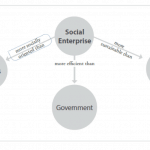How to Help Social Enterprises Scale: New Research Suggests it’s Not Just About Financial Capital
In Northern India, a small social enterprise turns fallen palm leaves into eco-friendly disposable paper plates. And in the process of turning waste into inspiring products, it does something even more beautiful: It creates jobs for the people who need them most. Over the past eight years, Tamul Plates has created 2,850 jobs for those living in extreme poverty. Its growth was accelerated with an investment from Upaya Social Ventures, which specifically focuses on empowering entrepreneurs who create businesses that employ those in poverty.
Over the last few years, Upaya Social Ventures has continued to raise funds so that it can invest in more entrepreneurs like Tamul Plates’ CEO Arindam Dasgupta, but it also knows that its support needs to go beyond money. Alongside its financial investments, Upaya has built talent and skill-building programs for all its investees. At the 2018 Social Capital Markets conference, Upaya CEO Kate Cochran spoke on a panel about this very topic. “Capital is only part of the acceleration puzzle,” she said. “As we continue to support more entrepreneurs creating socially responsible businesses that create jobs for those in poverty, we have learned that other support is also needed – namely supporting management with strategy skills to enable scale.”
Upaya Social Ventures is ahead of its time on this approach, and new research shows that these investments in the people behind the enterprises might actually be the most effective way to support young businesses in a growth stage.
Compelling Data, New and Old
In a first-of-its-kind report released late last year, the Aspen Network of Developmental Entrepreneurs (ANDE), in partnership with Argidius and the International Growth Centre (IGC), collected data about the value of this approach when it set out to answer two fundamental questions:
- How effective are interventions that support small and growing businesses?
- When small businesses grow, do they create jobs that reduce poverty?
The report provided some compelling, albeit early data, suggesting that investments in people might be the best investments when it comes to creating jobs. According to the report: “Training has been central in practitioner approaches to speeding up firm growth and building entrepreneurial skills.” However, not all skill-building initiatives are created equal. The report expands on this by stating: “…current research indicates that classroom training and information sharing alone does not improve performance, but personal interaction (through consulting and mentorship) can accelerate SGB growth.”
And this report is not alone. In 2012, a randomized control trial conducted by Yale, MIT and the World Bank showed that subsidized consulting services (aka pro bono skills-based volunteers) had a material impact in supporting the growth of small enterprises: “Using a randomized evaluation with 432 Mexican small and medium enterprises, this paper shows that access to management consulting led to better firm performance: one-year results show positive effects on return-on-assets and total factor productivity. Owners also had large increases in ‘entrepreneurial spirit’ (an entrepreneurs’ managerial confidence index). Using Mexican social security data, the analysis finds a large increase in the number of employees and total wage bill several years after the program.”
What type of skill-building efforts are best?
One study referenced in the ANDE report showed that for every $2,000 invested in consulting services, a new job was created (compared to $17,000-$60,000 for vocational training to create a new job). These reports corroborate our own findings at MovingWorlds, where we empower early-stage social enterprises by helping them access a global network of pro bono, professional consultants and trainers. In our survey data – as well as with our Skills Gap Analysis tool, which we use to educate organizations on how pro bono consultants can best support their work – we find that organizations and their leaders benefit from consulting and training projects, especially when these projects are related to helping the organization prepare for and optimize scaling efforts. More specifically, early stage and growing ventures that are producing revenue need help with two simple business fundamentals in order to increase their business sustainability and social impact:
- Getting products/services to customers more profitably
- Hiring leaders and developing their management skills, so they can take the enterprise to the next level.
Consulting is great for both of these objectives. It can improve strategic decision-making, process implementation and operational effectiveness, and help leaders use structured frameworks to prioritize work along these initiatives, and monitor the success of that work. The ANDE report also provided clarity on the type of professional support that would be most useful: “Peer learning improves firm performance, and firms learn best from those who are similar yet slightly more advanced.” This is another reason why skilled professionals who have “been there and done that” are so important to support the growth of social enterprises.
Simply stated, consultants that focus on best practices across critical business functions, and then train team members to embody them, can have a lasting impact across the key skill areas needed for enterprises to grow, from business strategy, sales and marketing, to supply chain and distribution.
In the same way that a scaling startup in Silicon Valley may hire consultants to help with user research, scaling technology and human resources – to name a few – scaling social enterprises should look for this same expert support. In the likely event that this talent is not accessible or affordable, finding pro bono consultants and trainers willing to travel and/or provide virtual support can provide the needed lift. Consultants can often provide value in a couple of days by sharing effective best practices and frameworks, like through a structured training. We also see that many projects only require a short one- or two-week sprint, where volunteer consultants can focus on a very specific initiative to conduct an analysis, provide strategic recommendations, and then transfer know-how to implement and/or improve processes and tools. While this type of project might not be as exciting as helping launch a new website or building a product, these strategy and/or operational improvements provide long-term benefits. And due to their short-term duration, these projects save time with on-boarding and acculturating new team members.
What we can do to build talent for the sector
Looking for external human capital support can provide long-lasting benefits, reduce the amount of financial capital needed, and ensure more efficient use of this capital when it’s procured. But while skill-building efforts are proven drivers of acceleration, this is where the social enterprise sector faces a challenge: Initiatives for capacity building, coaching and consulting are largely underfunded. According to the ANDE report: “Despite these positive effects, observational data show that firms seem to be unwilling to pay for individualized consulting despite the proven benefits.”
I closely monitor this sector, and I’m only aware of one large-scale funding initiative to tackle this challenge – the Argidius-ANDE Talent Challenge – which is nearly three years old and has not been repeated.
At MovingWorlds, we see three parallel paths forward for supporting inspiring enterprises:
Empower social enterprises to understand their biggest gaps: The saying “you don’t know what you don’t know” may apply to early-stage entrepreneurs more than any other group. Many entrepreneurs are facing challenges they have never faced before. With so much unknown, support must be provided to entrepreneurs to help them identify their biggest gaps. Tools like Open Capital Advisors’ Talent Diagnostic, Village Capital Talent Playbook for Startup CEOs, Siemens Stiftung’s empowering people. Network (epN)’s Self Assessment, and MovingWorlds’ Skills Gap Assessment are steps in the right direction. But more must be done to help social enterprises take a strategic approach to solving their human capital challenges.
Development organizations should budget for capacity building: Since investments in human capital are sometimes more effective in creating jobs than many other interventions, development organizations should look to integrate skill-building efforts alongside their existing initiatives. Take the epN, which sponsors the travel of pro bono consultants for its investees through its partnership with MovingWorlds, via its empowering people. Expert service. According to David Hoffmann, who oversees the program, the epN is saving over US $20,000 per consultant in capacity building support, while also finding expertise for social entrepreneurs that is otherwise inaccessible. For example, BEMPU, a social enterprise in India which sells a life-saving device to prevent infant mortality caused by hypothermia, was able to access world-class graphic design expertise from a highly skilled professional who traveled to India to provide his know-how free of charge.
Leveraging partnerships for talent: More partnerships need to be created to unleash expertise, considering that most professionals who have the needed skills are likely to be employed and working in full-time roles. Take, for instance, the Microsoft MySkills4Afrika program, which helps startups, universities, small and growing businesses, and even government entities access Microsoft’s employees for skills-based training and support. This award-winning program, co-designed and managed by MovingWorlds, provides leadership development experience to employees (previously discussed in SSIR here), market development opportunities for Microsoft, and critical skills transfer to enterprises across over 20 countries.
In conclusion
Three ingredients are needed to help social enterprises scale:
- A product/service that can sell
- A team that can operate effectively to profitably get the product/service to customers
- Financial capital to fund growth
Human capital is a key component in each of these ingredients. The above-mentioned research provides needed insights as to how different stakeholders can effectively partner to create the leaders and managers needed to launch and scale new social enterprise. If these stakeholders act on these findings, they can make the world a better place, and create jobs in the process.
Mark Horoszowski is the co-founder and CEO at MovingWorlds.org, a social enterprise addressing the global talent gap.
- Categories
- Investing, Social Enterprise



